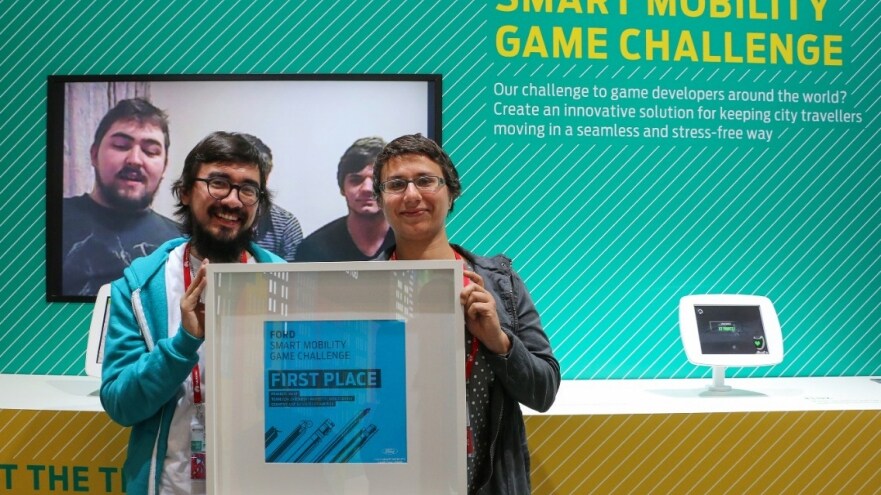- Ford names journey-sharing app Jaunt the winner of the Ford Smart Mobility Game Challenge – an initiative to use gamification to solve real-life problems in urban mobility
- Winner claims €10,000 top prize for app that helps people save money, make friends, and alleviate congestion by connecting with others for trips by car, bicycle and public transport
- SelfieGo is second with an app that gets commuters on their bikes and on foot with a selfie challenge. Third place went to Flux, an app designed to alleviate congestion through bringing gamification to traffic jams
- Ford Smart Mobility is the company’s plan to be a leader in connectivity, mobility, autonomous vehicles, the customer experience, and data and analytics
BARCELONA, Spain, Feb. 24, 2016 – A new app that could make journeys more efficient, more sociable and help to alleviate congestion has been announced the winner of the Ford Smart Mobility Challenge. The creators of journey-sharing app Jaunt were today presented with the €10,000 top prize at Mobile World Congress, in Barcelona.
Runner-up SelfieGo, an app designed to make journeys by bicycle and on foot more appealing, and third-placed Flux, an app designed to alleviate congestion through the gamification of traffic jams, were awarded a further €7,500 prize money. Developed with Cologne Game Lab and launched last year at Gamescom, the largest interactive games trade fair in Europe, the Ford Smart Mobility Game Challenge invited developers to create game concepts that could solve real-life problems in urban mobility.
Gamification has proven to be an effective way to solve real-life problems in many areas, including the search for a cure for AIDS, and the learnings from the challenge could lead to innovative solutions and new approaches to integrating urban transport, as well as encouraging positive commuter behaviour. Judges for the Ford Smart Mobility Challenge came from Ford, Cologne Game Lab, USC Games Program, Cologne International School of Design, and Turn 10 Studios.
“Game developers have an impressive track record in taking new ways of looking at real-world problems and coming up with fresh solutions, and that is exactly what we wanted to tap into for the Ford Smart Mobility Game Challenge,” said Ken Washington, vice president, Ford Research and Advanced Engineering. “Jaunt is the perfect example of just such a disruptive approach. Avoiding busy routes by connecting travellers to share trips could help to reduce congestion through ride‑sharing, and makes lives better by helping people to enjoy journeys more – whether travelling by car, bicycle, public transport, or on foot.”
Developed by Ilya Zarembsky and Betsy Medvedovsky, in New York, in the U.S., the Jaunt app enables users to both create journeys and join those created by others for fastest journeys or more scenic routes. An interactive map enables users to filter available “jaunts” by transport mode, location and time, and discover more about their fellow travellers. Sharing trips, the use of different traffic modes, and motivating travellers to use alternative routes will help to ease the pressure on main traffic routes and improve the flow of traffic in city areas.
SelfieGo, from Scotland, uses a GPS-enabled map that shows the optimal route to take selfies at a city’s major attractions, and enables users to share them on social media. The idea is to make travel on foot and by bicycle more interesting. Flux, from Germany, turns traffic jams into a game by encouraging drivers to maintain a steady speed using graphics projected on to the windscreen, helping traffic move more smoothly and preventing accidents.
Ford Smart Mobility is the company’s plan to be a leader in connectivity, mobility, autonomous vehicles, the customer experience and data and analytics. Looking for new and innovative ways to solve global transportation issues is integral to Ford’s transformation into an automotive and mobility company, with latest developments outlined by Ford President and CEO Mark Fields earlier this week.
Ford also has embraced gamification to accelerate the development of autonomous technologies and to enhance the Ford ownership experience. Ford’s SmartGauge technology rewards drivers for fuel- and energy-efficient driving, and the MyFord Mobile app enables drivers to remotely manage the charging of their electric vehicles and shows CO2 savings as exercise balls or hot-air balloons. Ford also is using gaming elements in developing MoDe:Link, the prototype journey-planning app that is part of the Handle on Mobility electric bike experiment, demonstrated at Mobile World Congress last year.

